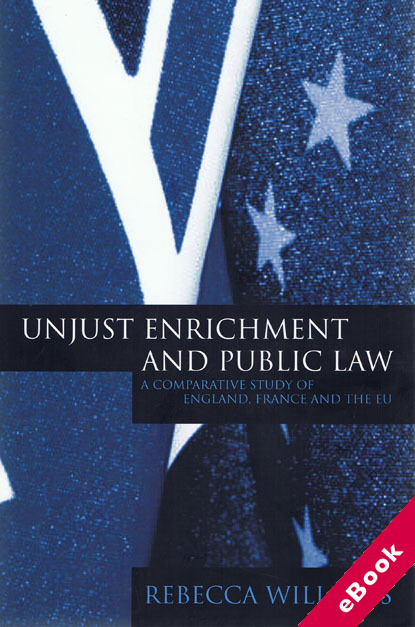
The device(s) you use to access the eBook content must be authorized with an Adobe ID before you download the product otherwise it will fail to register correctly.
For further information see https://www.wildy.com/ebook-formats
Once the order is confirmed an automated e-mail will be sent to you to allow you to download the eBook.
All eBooks are supplied firm sale and cannot be returned. If you believe there is a fault with your eBook then contact us on ebooks@wildy.com and we will help in resolving the issue. This does not affect your statutory rights.
The central aim of this book is to examine claims involving unjust enrichment and public bodies (bodies subject to judicial review) in France, England and the EC.
A central aim of the work is to explore the law as it now stands in the UK following cases such as Woolwich EBS v IRC (where the public body is the defendant) and cases involving swaps transactions (where it can be either claimant or defendant).
The author argues that so far these cases have been viewed from either a public or private law perspective, whereas in fact both branches of the law are relevant, and that the courts ought not to lose sight of the public law issues when a claim is brought under the private law of unjust enrichment. From an English perspective, the debate concerning the merits of civilian enrichment without cause, as opposed to common law unjust enrichment, has arisen in the context of public body claims.
The French experience, by comparison, demonstrates that the two sides of the issue, public and private, remain important regardless of the chosen approach to unjust enrichment; recognising these two aspects, rather than simply adopting the civilian approach, therefore enhances our understanding of these claims. No understanding of cases concerning public law 'illegality' can be complete without an examination of cases where that illegality is provided, not by domestic public law, but by the law of the EC.
Thus a further aspect of the book is that it investigates the division of labour between the European courts and the domestic courts in such cases, and defines the extent to which the two relevant issues, public law and unjust enrichment, are defined in EC law, and to what extent this task is left to the domestic courts.